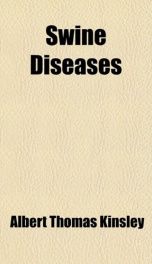swine diseases

Purchase of this book includes free trial access to www.million-books.com where you can read more than a million books for free. This is an OCR edition with typos. Excerpt from book: legs, which are bent or curved, the animal being "bow legged." The bones are soft and so spongy that they may be cut readily with a knife. The epiphyses of the long bones are enlarged and irregularly club-shaped, while the shaft is also irregularly thickened. There is a subperiosteal, spongy layer. The yellow marrow is red in color and is of a gelatinous consistency. There may be ulceration of articular surfaces, and the flat bones of the cranium and pelvis may be thickened and rarefied. The nares and mouth may be practically obliterated by the enlarged rarefied nasal bones and hard palate; the teeth may appear deep-set on account of the tumefaction of the alveolar tissue. In advanced cases, lesions may be found elsewhere causing disturbances of the digestive or respiratory system. Symptoms.The first evidence of the disease is weakness, diminished or depraved appetite, and diarrhea. But lameness or stiffness of gait succeeded by bending or arching of the bones is the first positive indication of rickets. At this stage the lying posture is almost continuously assumed. When the affected animals are made to arise they complain of pain by grunting and squealing, and not infrequently they will walk on the carpal joints. There may be nervous disturbances evidenced by dizziness, somnolence, and convulsions. As the disease progresses the enlarged epiphyses become evident and appear as a swollen condition of the articulation. Similar bony enlargements may also occur elsewhere. The bulging of the long bones of the front legs exert undue pressure upon the ribs, which results in disturbed respiration, and the vertebral column is variously curved, upward, downward, or laterally. This disease is of a chronic nature and continues for months unless death intervenes early, which is exceptio...
Info about the book
Author:
Series:
Unknown
ASIN:
117256132X
Rating:
3/5 (3)Your rating:
0/5
Languge:
English
Users who have this book
Users who want this book
What readers are saying
What do you think? Write your own comment on this book!
write a commentif you like swine diseases try:
Other books by this author
Do you want to exchange books? It’s EASY!
Get registered and find other users who want to give their favourite books to good hands!

